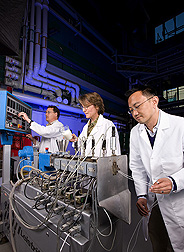This page has been archived and is being provided for reference purposes only. The page is no longer being updated, and therefore, links on the page may be invalid.
| Read the magazine story to find out more. |
|
|
|
|
Helping Corn-Based Plastics Take More Heat
By Marcia WoodSeptember 1, 2010
Your favorite catsup or fruit juice might be "hot-filled" at the food-processing plant—that is, poured into its waiting container while the catsup or juice is still hot from pasteurization. Current containers made from corn-based plastics literally can't take the heat of hot-filling, according to U.S. Department of Agriculture (USDA) chemist William J. Orts.
But Orts and a team of collaborators from Lapol, LLC, of Santa Barbara, Calif., hope to change that by making corn-derived plastics more heat-tolerant. Orts and Lapol co-investigators Allison Flynn and Lennard Torres are doing the work at the Agricultural Research Service (ARS) Western Regional Research Center in Albany, Calif., where Orts leads the Bioproduct Chemistry and Engineering Research Unit. ARS is USDA's principal intramural scientific research agency.
By boosting the bioplastics' heat tolerance, the collaboration—under way since 2007—may broaden the range of applications for which corn-derived plastics could be used as an alternative to petroleum-based plastics.
Corn-based plastics are made by fermenting corn sugar to produce lactic acid. The lactic acid is used to form polylactic acid, or PLA, a bioplastic. The Albany team is developing a product known as a heat-deflection temperature modifier that would be blended with PLA to make it more heat-tolerant.
The modifier is more than 90 percent corn-based and is fully biodegradable. There currently are no commercially available heat-deflection temperature modifiers for PLA, according to Randall L. Smith, chief operating officer at Lapol. ARS and Lapol are seeking a patent for the invention.
Read more about this and other ARS corn research in the September 2010 issue of Agricultural Research magazine.

